Archive for 'Grammar'
Some Insights into Arabic Verb Usage (1) Posted by Ibnulyemen اِبْنُ اليَمَن on Sep 11, 2018
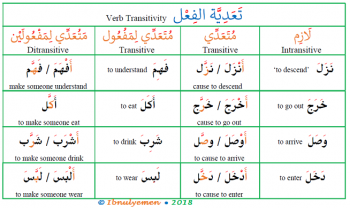
Certain rules of Arabic verb conjunction, formation, meaning, and pronunciation are oftentimes overlooked because they are minute and needs a meticulous learner or instructor to discover and/or pay attention to. Knowing these niceties lead to more accurate language use and speedier language learning overall. This post gives a list of rules and illustrations that concern…
Some Common Particles in Arabic (3) Posted by Ibnulyemen اِبْنُ اليَمَن on Aug 30, 2018
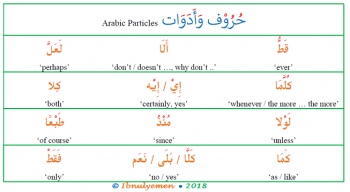
In the previous two posts, you learned how some Arabic particles are used and what they mean. Given their functions in style, sentence transition, conciseness in speech and written language, and idiomatic usage, another post is yet again dedicated to these important words. Some of these words are called حَرُوف ‘particles’, and others are called…
Some Common Particles in Arabic (2) Posted by Ibnulyemen اِبْنُ اليَمَن on Aug 28, 2018
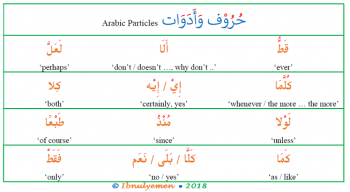
In the previous post, you learned how some Arabic particles are used. This post continues with another set of particles explaining their possible meanings and how they are used. As seen with the first set, the meaning may be determined by the context in which they occur. They are mostly functional words that are not…
Some Common Particles in Arabic (1) Posted by Ibnulyemen اِبْنُ اليَمَن on Aug 26, 2018

Words in Arabic are classified into three parts of speech: a noun اِسْم, a verb فِعْل, and a particle حَرْف. Essentially, particles have no meaning by themselves, that is, they must be added to another word or be part of a context. They modify the meaning of other words, help with sentence transition (i.e. style)…
Arabic Number-gender Agreement and More Posted by Ibnulyemen اِبْنُ اليَمَن on Aug 16, 2018
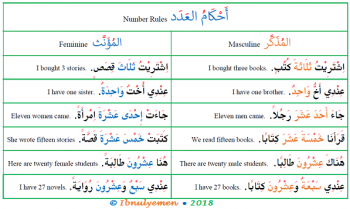
As stated in the previous post, the agreement between the gender of the noun and the number that qualifies it is confusingly difficult for native speakers and learners of Arabic alike. This is especially true with cardinal numbers الأَعْدَاد الأَصْلِيَّة. With other number types, the agreement is straightforward and always requires the addition of the…
Active and Passive in Arabic: Practice and Examples Posted by Ibnulyemen اِبْنُ اليَمَن on Jul 31, 2018
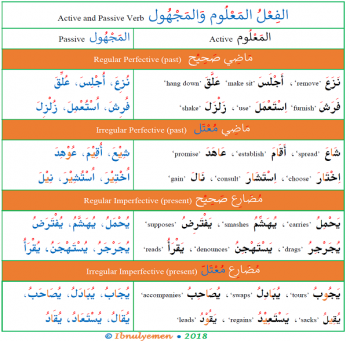
In the previous post, you learned about the passive voice المَبْنِي لِلْمَجْهُول in Arabic, and how an active مَعْلُوم sentence is changed into passive مَجْهُول. Besides leaving some words out from the active sentence, verbal internal (i.e. non-final) diacritical marks or short vowels must change. This is essentially the most obvious change in verb forms…
Changing an Active Sentence to Passive in Arabic Posted by Ibnulyemen اِبْنُ اليَمَن on Jul 24, 2018

To a change an Arabic sentence from active مَعْلُوم to passive مَجْهُول, its verb must be transitive مُتَعَدِّي. That is, it must have at least one object مَفْعُول. The sentence that includes an intransitive لَازِم or non-conjugatable جَامِد verbs cannot be changed into passive. This post is about why passive is used in Arabic, and…


